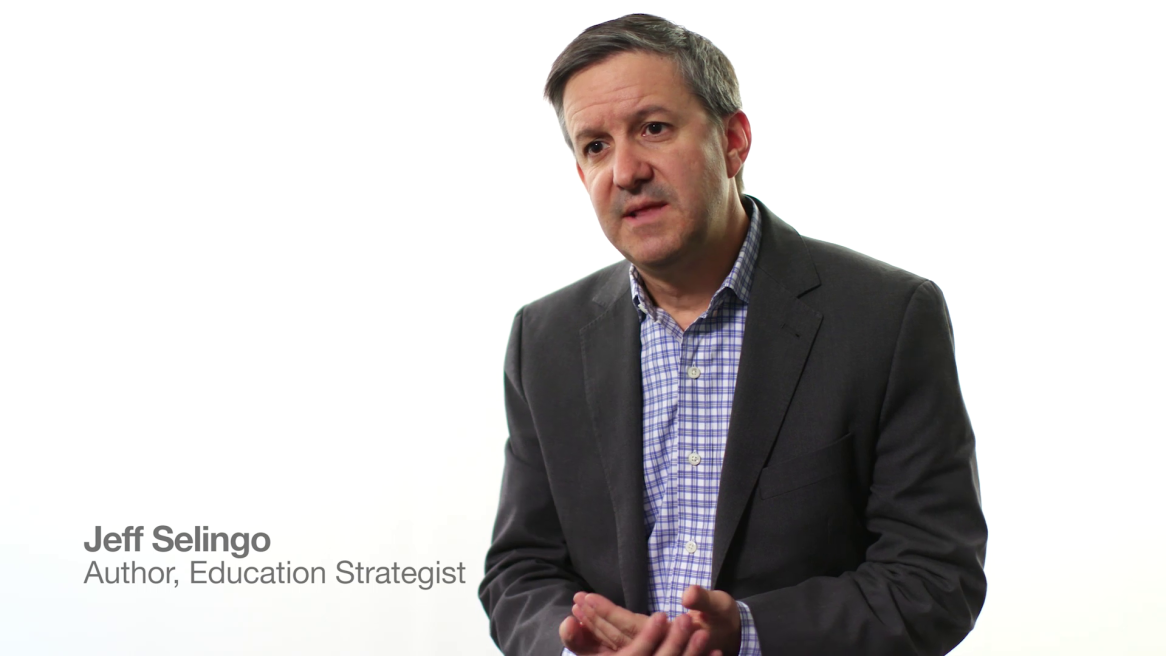Trends for the Future of Education with Jeff Selingo
How the future of work and new technology will make place more important than ever.
If robots are going to take our jobs, then how should the future of education change? How can educators better prepare students for the future of work? How will artificial intelligence and big data change the types of skills people need, and the ways and places they’ll learn? These are the issues Jeff Selingo has spent the last 20 years studying. Selingo is the author of three books, including a New York Times bestseller, a special advisor and professor of practice at Arizona State University and a visiting scholar at Georgia Tech’s Center for 21st Century Universities.
360 spoke to Selingo about his vision for the future of education and why the places people learn will become more important than ever.
NEAR + FAR TERM TRENDS
When he looks at the near-term in education, Selingo cites a few trends as being most impactful. One is the ability to harness data to allow for personalized learning. He says the lecture hall with hundreds of students learning the same information, in the same way will become a thing of the past. Professors will use online learning tools to track the pace of each student, answer questions in advance and see which concepts students have difficulty grasping. Data on performance, failures, class schedules and majors will help educators craft the best experience for each student based on previous success rates.
The longer-term trend, according to Selingo, is around lifelong education. “When we think of school now, we think of it as something that happens to young people, and it happens early in their life. But, the need for new skills to keep up in almost any job will require learning for the rest of your life,” he says. He imagines schools around the world creating content that allows you learn in the moment and keep up in life.
THE FUTURE OF THE FACULTY OFFICE
Jeff Selingo recently published this deep-dive about rethinking traditional spaces to create a student-centered university.
IMPACT OF TECHNOLOGY
Selingo sees artificial intelligence and big data as game changers for higher education. He says AI can free up professors and advisors to spend more time with students by answering some more frequently-asked questions and handling some of the grading. He also says data can help us track and predict student performance to help them create better outcomes. “When they come in as a first-year student, we can say ‘People who came in like you that had similar high school grades and took similar classes ended up here. So, if you want to get out of here in four years and have a successful career, here are the different pathways you should follow.’”
IMPACT ON PLACE
While online learning will have its place, Selingo says our desire to learn with others and in person will be stronger than ever. He imagines a future where online classes are connected to a community of learners and educators. He says the physical environment will evolve to key in on the need for people to work on problems together, do teamwork exercises and socialize in a way they can’t online.
Selingo recently published a whitepaper that takes an in-depth look into The Future of the Faculty Office. In it, he speaks to Elliot Felix, founder of Brightspot Strategy, a New York-based design consulting firm that has advised more than 70 colleges.
“There’s a growing awareness of a disconnect between the spaces universities provide and what people actually need,” says Felix. “We’re on the cusp of people saying that maybe there are more effective ways for us to allocate and use our space while still enabling people to be productive and engaged.”
For more information on rethinking traditional spaces to create a student-centered university, you can download The Future of the Faculty Office, watch the video and listen to the podcast.


